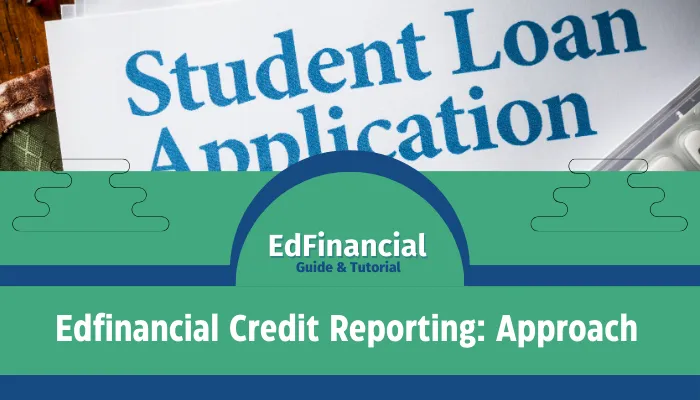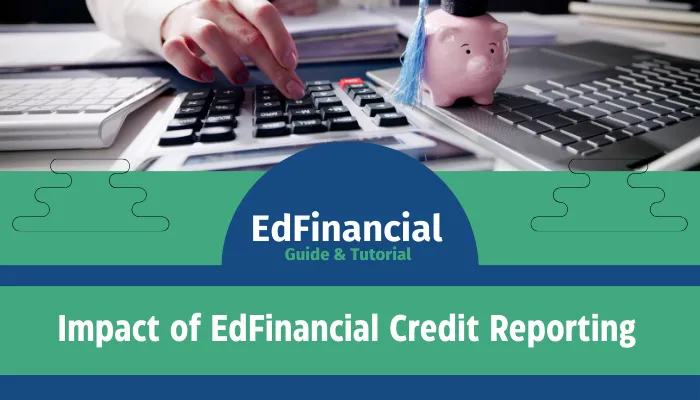Welcome to the exclusive guide on EdFinancial credit reporting. For a student loan borrower with EdFinancial as your servicer, it is essential that you understand how they report your credit if you want to be fiscally fit.

In this article we will go deep into EdFinancial specific practices of credit reporting ,how it can affect your credit score and what are things which should be done to ensure that the credit report accurately reflects the status of your loans.

Edfinancial Credit Reporting: Approach
Edfinancial has been involved in providing services to students’ loans for the last 25 years. Unlike other servicers who handle various types of loans, Edfinancial majors on student loan dealings giving them a unique aspect towards the needs of students’ borrowers. Their niche orientation influences their approach to credit rating:
- Customized Reporting: Consequently, its credit rating is specifically made with focus on such kind of student loans.
- Understanding Students Problems: They have more potential responsiveness in relation to unique challenges experienced by student borrowers when dealing with issues related to their credits thanks to their knowledge about borrowers experience.
- Customer Support Specialization: Whenever you therefore need support from Edfinancial regarding your EdFinancial credit reporting problems, representatives handling these cases have full knowledge about how student loan credits work.
What does EdFinancial do in Your Credit Journey?
EdFinancial is your loan servicer and it plays a huge role in shaping your life financially.This could look like the following:
- Every month they submit reports concerning the status and payment history of your loan to three main nationwide consumer reporting agencies including Equifax, Experian, TransUnion
- The data they deliver takes up significant space at least as far as young borrows who lack much history are concerned.
- This information can either help or hinder access any other form of borrowing like getting approved for a mortgage or even being able secure a line of credit.
EdFinancial Credit Reporting: Details
Let’s take a closer look at how EdFinancial credit reporting is handled. By understanding these specifics, you can better manage both your loans and your credit score.
What is Reported by EdFinancial?
EdFinancial credit reporting is thorough. Here are some typical items they include:
- Loan Details:
- loan size
- remaining balance
- loan type (federal or private)
- terms of the loan (e.g., repayment period and interest rate)
- Payment History:
- last payment date
- on-time payments made
- any late payments (30, 60, 90 and more than 120 days overdue)
- Account Status:
- current
- delinquent
- in default
- in deferment or forbearance.
- Loan Responsibility:
- individual loan,
- co-signed loan.
When Does EdFinancial Report?
Normally, Edfinancial reports to major national bureaus on a monthly basis although this specific date may vary with time. It is important to note that there might be a delay between when you make your payment and when it appears on your credit report card as it could take anything from few days to several weeks.

Impact of EdFinancial Credit Reporting
EdFinancial’s credit reporting can have a huge effect on your credit score. Here are the ways in which various aspects of their reporting influences your score:
- Payment history (35% of FICO score):
- Timely payments reported by EdFinancial improve your score
- Late payments can hurt your score significantly
- Amounts owed (30% of FICO score):
- Your credit utilization ratio is affected by the balance EdFinancial reports on your original loan amount
- Length of credit history (15% of FICO score):
- Age of your EdFinancial loan account goes to your history length
- Credit mix (10% of FICO score):
- Student loans serviced by EdFinancial may help diversify your mix.
- New credit (10% of FICO Score):
- Though, it does not directly relate to Ed Financial’s report, this category may be influenced through applying for new student loans or refinancing existing ones.
Tips For Borrowers
To maximize EdFinancial’s credit reporting and keep a healthy credit score think about these best practices:
1. Keep up with Payments
Making timely payments consistently is the single most powerful way to positively influence EdFinancial’s credit reporting system. Here are some strategies to consider:
- Use the edfinancial.com website to set automatic payment systems.
- Create reminders on dates when payment is due.
- Reduce balance faster when possible by paying more than minimum.
2. Regularly Monitor Your Credit Report
Keep a watchful eye to how lenders like edfinancial have reported on you as a borrower;
- It is recommended that you order free annual copies of all three reports from AnnualCreditReport.com.
- Monitoring services from your bank or credit card company can be used to keep track of how edfinancial reports loan status
- Particularly if you have recently changed a payment plan on the student loan or requested forbearance/deferment, watch how edfinancial is reporting your loan status.
3. Proactive Communication with EdFinancial
Do not wait until a missed payment; approach them before. To avoid negative credit reporting, there are several options available at Ed financial:
- Income-driven repayment plans for federal loans
- Deferment or forbearance for qualifying circumstances
- Loan consolidation options
4. Understand Loan Changes’ Effects
EdFinancial’s reportage of your credit could be changed by some modifications in your loan:
- May show up as a new loan account on your credit report upon consolidation
- The original loan will be closed and a new one will be reported when refinancing
- Loan forgiveness or discharge would appear as “closed” on the account balance form
5. Benefit from EdFinancial’s resources
EdFinancial has a variety of tools and resources that can help you in managing your loans and understanding credit reportage:
- Online loan information portal in real time
- Educational materials on credit reporting and loan management
- Customer service representatives with credit report training

How to Deal with EdFinancial Credit Reporting Errors?
Despite best efforts, mistakes in credit reporting do occur and here are steps to take when faced with one:
1. Identify the Error
Always review your credit reports for any inconsistencies emanating from how EdFinancials handles your loans such as the following:
- Incorrect loan amounts
- Misreported payment histories
- False account statuses.
2. Gather Supporting Documents
Before pursuing EdFinancial credit reporting contact process, make sure you have documents that will back up the claim that you will make:
- A bank statement showing timely payments;
- Communication between yourself and Edfinancial regarding changes in your loan status; or,
- Any other relevant document concerning your loan.
3. Get In touch (EdFinancial credit reporting contact)
Reach out to Edfinancial’s dedicated department that deals with credit reporting issues which includes;
- EdFinancial credit reporting contact: 1-8003376884
- Email: [email protected]
- Mail: Ed Financial Services, Attn Credit Reporting Dept., P.O. Box 36008, Knoxville, TN 37930-6008
But when doing it remember to:
- Clearly describe the error you’ve found;
- Give them all documents supporting your case; and,
- Request for a timetable on when they shall investigate and fix this mistake.
4. Follow Up and Escalate if Necessary.
In case the issue is not resolved by Edfinancial within shortest possible period then apply these steps:
- After 30 days send another correspondence;
- At least consider getting into a direct dispute with the bureaus concerned about it; or at last resort,
- Go ahead and lodge a complaint to the Consumer Financial Protection Bureau CFPB.
EdFinancial Credit Reporting During Special Circumstances
There are specific situations that can affect how EdFinancial records your credit details. The following are some examples:
1. Deferment and Forbearance
If you have been granted deferment or forbearance:
- Your loan account will be reported current by EdFinancial
- There should be no negative effects on your credit score
- Nonetheless, interest accruals could raise your loan balance over time.
2. Income Driven Repayment Plans
In case you go for an income-based repayment plan;
- Edfinancial will report the amount of the new payment to be paid
- Payments under these plans are considered timely and full
- Your credit report will show lengthier term of repayment
3. Loan Rehabilitation for Defaulted Loans
When someone is on a rehabilitation program for defaulted loans,
- If you make the required rehabilitation payments, then Edfinancial reports your account as current.
- This removes default status from your credit report;
- Late payment history beyond default remains in your credit report.
4. Loan Consolidation
Upon merging loans into one,
- The original loans should read paid in full and closed.
- A new loan account appears at the borrower’s credit report
- Temporary lowering of average age of accounts which might affect his or her credit score.
5. Loan Forgiveness
If qualifications for loan forgiveness have been met,
- EdFinancial’s forgiven loan shall be recorded as cleared
- This closes the account of that particular loan on personal credit report
- This generally has a positive impact on your credit score.
The Future of EdFinancial Credit Reporting
As student loans change, so too may Edfinancial credit reporting practices. Some possible future developments include:
1. Enhanced Real-Time Reporting
Financial technology are giving way to better ways of carrying out business in financial institutions and for that matter EdFinancial might as well improve towards frequent or real-time credit reporting. This can give borrowers a more up-to-date view of their credit standing.
2. Integration with Financial Wellness Platforms
In this case, EdFinancial may cooperate with monetary well-being software or applications to enable borrowers realize the effect of loan repayments on the overall financial health in real time.
3. More Granular Reporting
Perhaps future Consumer Credit Reporting could provide information on repayment behaviour, like percent of income going towards loan repayments or participation in financial education programs.
4. Alternative Data Inclusion
Credit agencies are increasingly considering alternative data. For instance, EdFinancial might start including additional information that can boost borrower’s credit profiles such as completion of degree programs or successful career placement.
5. Greater Borrower Control
For example, we may see more tools for borrowers from EdFinancial that could be used proactively to manage how loans are reported which include adding notes to explain certain circumstances on your credit report.
Conclusion
Remember that if you ever have questions or concerns regarding how EdFinancial credit reporting is done, don’t hesitate to reach out to their dedicated credit reporting contact channels. It may take effort, but the payoff towards your financial future is worth it. The EdFinancial credit reporting contact is provided above.
If you want to have a good credit profile while managing your student loans, understanding how EdFinancial operates is very important. Take note of these key points:
- EdFinancial reports your loan status and payment history monthly to the major credit bureaus
- On-time payments are crucial for positive credit reporting
- The accuracy of your regular credit report should be checked periodically by you
- Appreciate the effects different strategies for managing loans can have on your report.
